#some of these are from before i was born
Text
i'm in this weird situation where pieces of media (especially movies/tv shows) some of which i have never seen are just a part of my everyday life now
1 note
·
View note
Text
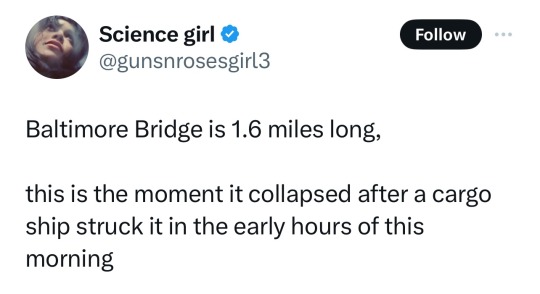
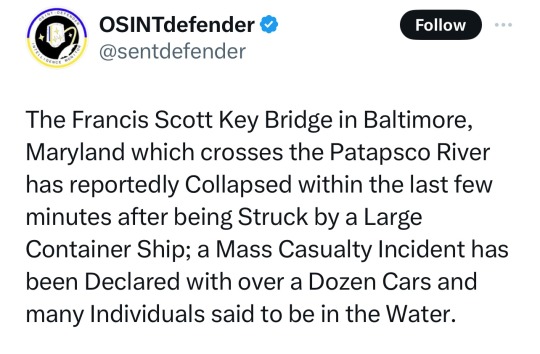


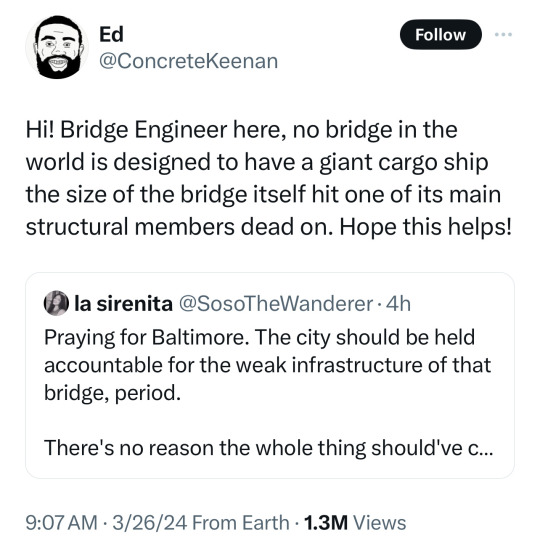



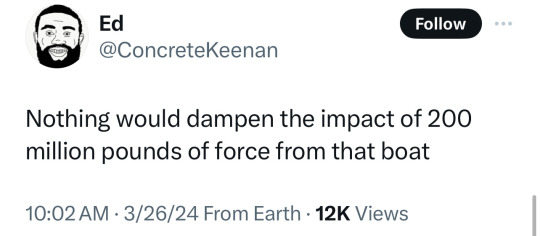
The crew of a massive container ship that crashed into the Francis Scott Key bridge in Baltimore early Tuesday warned of power issues before the collision, which caused the bridge to collapse into the frigid Patapsco River, officials said.
Maryland Gov. Wes Moore said the warning from the ship’s crew likely saved lives.
“We’re thankful that between the mayday and the collapse, that we had officials who were able to begin to stop the flow of traffic so more cars were not on the bridge,” Moore said. He called those officials heroes.
Moore noted that the bridge was up to code at the time of the collapse. He said the collapse was a “shocking and heartbreaking” event for the people of Maryland who have used the bridge for 47 years.
(continue reading)
#i was in dc this weekend for a funeral#we bounced over to baltimore to visit some family friends from childhood#i drove over that bridge twice!!#francis scott key bridge#baltimore#bridge collapse#baltimore bridge#glen burnie#i dont think it was an infrastructure problem#but if oversized cargo ships can gain that much momentum#then maybe they should be required to come to a complete stop#prior to going under a commuter bridge#that or maximum ship size requirements by bridge#or maybe use tugboats??#it seems more like a regulation issue#and yes - even if it was an accident#someone still needs to be held accountable#or it may happen again#a very similar incident happened in my hometown#i think about 4 or 5yrs before i was born#sunshine skyway bridge
4K notes
·
View notes
Text
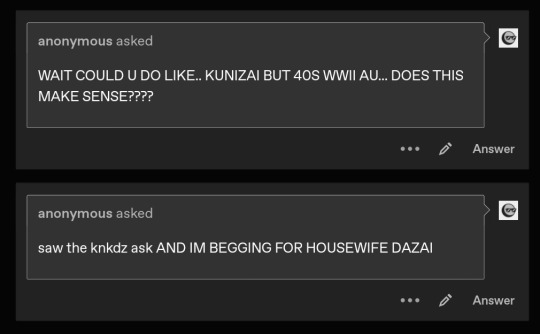
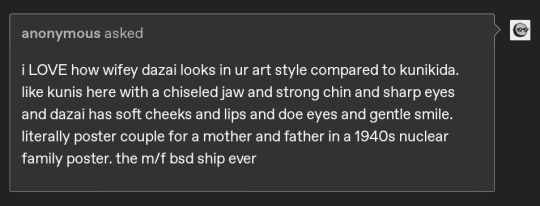

i think you guys are onto smth..

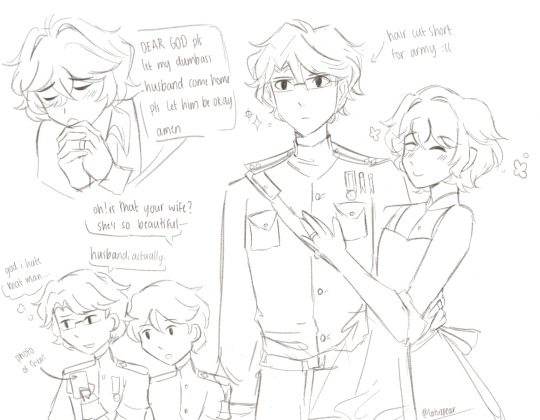
i unironically got invested in this HELP
#WHERES THE FIC AT IF SOMEONE WRITES THIS I WILL PAY THEM A HUNDRED DOLLARS😭😭#kunikida serving the country while dazai's serving cunt😔#dazai was born to malewife but forced to manipulate and i think that's the greatest tragedy of bsd#anyway some facts i would like to share abt this au thay i came up w while drawing!!#takes place in 1939 (start of wwii) and there was a mandatory draft that required one male over eighteen from each house to serve#both of them are still twenty two and had been engaged for abt two years before getting married that year#newlyweds! unfortunately kuni had to go fight and they were seperated :(#before the war kunikida was a math teacher at the local high school and dazai obviously managed the household and didn't work#he's hopeless at cooking and meal prep even w recipie books so they either get those prepackaged meals or kuni makes dinner when he gets ba#so like when he's making lunch for kunikida he normally just packs a basic sandwich w raw fruit#kunikida always appreciates the effort even tho hes probably sick of having the same thing everyday but he won't complain abt it#when kunikida joined the army he was relieved that the mess hall had better food than dazai#he was the only one in his platoon that never complained abt the food so his fellow soldiers assumed it was bc he came from a tough bg#when in reality he was just used to being poisoned on a daily basis from his dumbass husbands cooking and was hardly fazed from army ration#they write to each other although its more dazai sending and kuni receiving bc hes off fighting and doesnt have time to write back#dazai talks abt life on the homefront and how he has to grow a victory garden (everything is DYING HE CANT EVEN RAISE TOMATOES)#and kuni writes abt his fellow soldiers and how the war is going and when he thinks he'll be home and how he misses sleeping in a bed#ANYWAY yea thought i'd share sry for infodumping in the tags again#this post is for like the four ppl that care abt this specific flavor of knkdz so hopefully this gets four notes at least#bungou stray dogs#bungo stray dogs#dazai osamu#osamu dazai#kunikida doppo#doppo kunikida#kunikidazai#knkdz#lotus draws#bro sry for posting at two in the morning i couldnt sleep until i got this out of my head they have infested my brain
1K notes
·
View notes
Text
Truly wild that people are like “Omg! Taylor Swift is including her new music as she tours!” Yeah, bestie. That’s what tours are. Literally it’s the whole point. What would be crazy was if she did the Wenis, because the Wenis is a dance and everybody is a genius who knows it in advance
#taylor swift#dropout#dropout tv#game changer#this joke???#who is this joke for#me certainly#but like who else?#the tortured poets department#ttpd#ts ttpd#the wenis is a dance#Also if any of you try to come for me#just know that I’ve BEEN out here#I was a swiftie before some of you were BORN#I was there in the dark times#you summer child#do not cite to me the stories of the Old Gods#I was there when they rose from the sea and blessed us
242 notes
·
View notes
Text
[ cw: assumed death / assumed sibling death / assumed child death / solitude ]
Thinking about Leo being trapped in the Prison Dimension and keeping himself warm through the power of his own ninpo - this ability is shown to us as a flame, after all, so imagine if, when he lets his mystic energy run through him, it warms him up, just a little.
In this desolate place, all cold and alone, he focuses on that flame and leans into its warmth.
He relies on it, and he realizes it that he’d relied on it too much when it goes out, and he’s once again cold.
(In another dimension, the Hamatos believe they lost one of their own.)
#rottmnt#rise of the teenage mutant ninja turtles#rottmnt leo#rottmnt headcanons#rise leo#assumed death /#assumed sibling death /#assumed child death /#he’s NOT dead but they don’t know that#anyway I think about Leo’s ninpo being the flame for everyone else’s to circle around a Lot#tbh I like to think that the turtles always had some innate mystic energy about them#even before they were mutated#I think they were chosen for a reason#If you look past the lens of a cartoon then they (especially Leo) were all more aware than most turtles usually are#imagine Leo always even from birth having that innate energy within him - a warm hearth that just makes him approachable#look at his baby self’s face cmon#anyway speaking of Leo and Warmth did you know that RES eggs that hatch at higher temperatures are born female I thought that was interesti-#sorry couldn’t resist but!! just sayinggg#he’s the one who prepares for cold temps and who actively tries to bask in a spa#my boy loves to be Warm#(because he was born warm-)#these tags are so much less serious than the post sorry guys
221 notes
·
View notes
Text
Wild and revolutionary concept: maybe don't treat converts like trash just because they're converts? And also don't ask someone if they're a convert in a public setting?
#having lunch before shabbat and had to remind my friend not to do this to people#like i get it might be a hard concept for some born jews to understand but one thing jumblr has taught me#is that its a sensitive and private topic#you dont just.bring it up. especially not in front of people?#because i have seen other born jews get all Different when they find out someone is a convert#and its crazy disrespectful#side note you can disagree w a convert about their opinions on certain things#and still not go after them for being a convert#thats a dif topic though#anyway unless the convert is openly inviting that convo#dont fucking bring it up????#jumblr#judaism#jewish#jewish conversion#like it prob feels like how i do when someone treats me dif for being baal teshuva#its just a shitty thing to do in general#dont bring it up?#if you have to ask they prob havent told you for a reason#yes even if its from a movement you don't think is vaid#like what do you expect them to go back to their rabbi and be like 'is like to return this conversion and exchange it for orthodoxy'#thats not how it works they already converted to that movement what is the point of you trying to make them feel bad about it#like what do you change or affect by doing that#same w being baal teshuva#you want me to get in a time machine and tell my parents to move to a jewish community?#whats the point of saying anything just shut up
735 notes
·
View notes
Text
The fun thing about CFAU danny is that he grew up in crime alley during his early developmental and foundational years, and was only in amity park for four years before his accident. Which means: potential to explore how this affects his personality. How does he act?
If he grows up in crime alley, which is rife with violence and crime and he like everyone else bares witness to it, how will that change who he is compared to canon?
Because he’s not gonna be the exact same as canon, thats not how development works. Something’s gonna change. So is he violent? Is he a thief? A liar? A follower, a leader? A backstabber? How selfish is he? Because selflessness gets you killed.
How willing is he to get shot/stabbed/murdered/trafficked for another person when he’s surrounded by people who take priority over themselves more than others? And is largely not taught otherwise? (And are valid for their self-preservation?)
What’s his kindness look like, is it rough? Tough love all the way through, showing other kids how to bloody up their knuckles to keep their own face safe?
Showing kids how to file down their teeth with the broken glass at their feet, so that when they bite they make it hurt?
Or is it more gentle, but still bloody, showing kids how to keep their head down and out of the way of the bigger, meaner kids barreling their way past? How to blend in, how to hide? How to not get caught?
Is it a third option, and always bloody, always hurting? Does he get in the way, take the hits? Always a shield, never the shielded? His nose having been broken so many times it’s permanently crooked, are his eyes always black? His lip always bleeding? Does he have scars?
Is it a fourth option, a fifth option, a sixth? Is it bloody? It may as well be, Crime Alley is always bloody. Always bleeding. Danny will see death, he will see suffering, he won’t unless he closes his eyes and covers his ears.
Does he have bad habits? Stealing, smoking, drinking, kids mimic the adults and even if his parents try to teach him out of it, it takes a village to raise a child. If the village is violent, then the child will be too. Is he malnourished? Jason was. He will be.
How does Dan change in comparison to canon vs a Danny who grew up in crime alley? Does he change at all? Or is Danny just more horrified by him, because he’s more similar to him than he previously thought?
What are his thoughts on Batman and Robin? Does he like them, think them myth, distrust them? How does his time in Gotham influence his perspective on the people there, on the world around him? His thoughts on Bruce Wayne (beyond the improbable him immediately figuring out Bruce Wayne = Batman)? The Elite? Does he have an accent? What’s his education like?
And CFAU Danny is fun because I get to explore that. He is ultimately still Danny - still kind, and selfless, sarcastic, punny. But how does he show it? What other traits does he have? What has changed, and what has stayed?
#dpxdc#dp x dc#dp x dc crossover#danny fenton is not the ghost king#dpxdc crossover#dpdc#childhood friends au#cfau#just some food for thought. i dont see many aus where danny actually grows up in gotham#like i’ve seen plenty where he’s BORN in gotham#but he’s always out of it before it had any affect on his development and growth#like even if he moves out at eight that’s still gonna affect his personality#kids have a ton of personalities by the time they’re five#like they’re not babbling toddlers#and this is coming from someone who works with 5 year olds and up daily#theyre immature yeah but they have personalities#they’re people#so if danny grows up in gotham and moves out at say. 9. he’s still gonna be affected by his timere thete#ESPECIALLY in crime alley. like there’s no getting out of that#and it doesnt have to be a drastic change but there’s gonna be something#like what i said above: is he a liar? a thief? violent? mean? a backstabber?#was he following a kid gang or was he leading one?#he’s not gonna be sunshine and daisies. something about him is gonna be selfish. mean. what is it?#how much is it?#is he manipulative?#selflessness will get him shot so when does he step in? how?#oh or if he does grow up in gotham - specifically crime alley - he’s exactly the same#which is… interesting to me#canon danny wouldnt really like cfau danny. too much likeness to dan
214 notes
·
View notes
Text
man we all know charlie had an emo phase but I really wanna explore the possibility she wasn't always the charlie we see now. she wasn't always gentle or kind or optimistic and all of those things are hard-won after battling the opposite. that maybe at some point, bitterness and anger and spite started eating her alive and she changed for herself first. that her kindness is selfish at its root, that her altruism is self-serving above all else, because if she kept on the same path, there might be nothing else left of her. and at some point it stopped being about her and started to be about others.
and as a bonus? this version of charlie would pair perfectly with a version of vaggie who wasn't always guilt-ridden, who truly believed in her cause. who was lethal and ruthless and loved what she did because she believed and ultimately it was what did her in. who had truly never hesitated before that child, because extermination wasn't just a necessity, it was a game. entertainment.
idk I just. I love their dynamic already so much but the contrast of charlie becoming optimistic for herself vs vaggie developing guilt and shame over others, and both of them finding the harmony between those extremes?
#idk i think about them a lot#its like almost a dark!charlie au but not exactly yknow#vaggie being happy and carefree and steadfast in her beliefs before her fall#the angst potential is ugh#chef kiss#anyway#chaggie#charlie morningstar#vaggie hazbin hotel#vaggie#hazbin hotel#rainbowmoth#to some extent i do think charlies optimism is a front#not like shes disingenuos#but where alastor smiles so nobody knows whats going on under the surface (manipulative)#charlie smiles so nobody knows whats going on under the surface (defensive)#if she smiles through the pain did it really happen?#if she laughs at jokes at her own expense do they still hurt?#ow i hurt myself with this one#and then imagine vaggie never experiencing shame or guilt or regret before she fell#imagine how much worse those would feel the first time experiencing them#her entire world drops out from under her and it leaves scars#both physically AND mentally#but her scars make her softer#gentler#but also sadder and yes more defensive#just not the same way charlie is#the two of them seeing gentleness borne of violence in each other#UGH i have to write it dont i
55 notes
·
View notes
Text
the only good thing that happened to childe in his 4.0 comeback is that he got a new magical girl transformation animation especially the final part.. absolutely magical

#like he didn’t get to talk to traveler about his siblings#his vision doesn’t work#hes getting some weird ass dreams#clorinde didn’t take his fight seriously#he got accused of a crime that happened (or started happenin) before he was even born#the stupid machine still deemed him guilty even the the actual criminal was caught#he didn’t get to finsh his transformation#bet that has some health implications#he was smacked to the floor by a dudes cane and jailed#JUSTICE TO CHILDE IN THE LAND OF JUSTICE#at least he’ll have a chance to spar with wrio#genshin impact#childe#fontaine spoilers#fontaine archon quest#also.. i kinda want to ship him with neuvillette#tartali is from the past tarvillette is the new ship
332 notes
·
View notes
Text
I dislike takes that Danse would be just as conservative in modernized aus when it's clearly shown his staunch views of things come from his time in the Brotherhood and his deep-rooted desire to belong to something with a greater purpose.
Not to mention lines that show much more open-mindedness that get overlooked for his harsher sentiments when you first meet him. Like the oppurtunity to be a part of something is why Danse fell so far into Brotherhood dogma and it doesn't negate the offense things he does but I feel like it's just lazy to be like "hmmm he'd def be racist" just so it aligns to his BoS beliefs.
#like i genuinely think he would like not fall into the military if he was in modern times because of all the other things he could do#he clearly has a passion for tech and mods and likely would find himself more useful as like a mechanic like at most hes one of those range#types or something but I feel like people equate his seriousness and him being a military man to closemindedness when its like having to ge#a new view point like we really dont know what he believed in before the BoS if he believed in anything at all outside of selling scrap to#survive before basically having an army recruiter have him join one of the scariest factions like why is the BoS so fucking violent???#like the BoS operates in such a way cause there is no civilian population like everyone is something or training to be so they arent really#fighting for anything but themselves at this point which is just a feedback loop of gaining more power and is not equatable to real#military people due to the fact most of the recruits are really born and bred to be soliders while say irl you have a family and country to#fight for and return to outside the military which is def grounding as Danse wouldn't be in the army 24/7 like in canon#idk its odd to me when a character that is has fantastic racism ergo the trope of bigotry to fake races people try to translate it to real#life especially when those races have not equivalent like tell me what is the irl equal to a fucking ghoul or super mutant like????#racism is not like a funny headcanon like making him a defrosting prude or by the book is whatever but he would not be a bigot just like a#narc or some shit hed tell on me for loitering but I know hed tear apart each voting party and likely the military for being self serving#and like knows all about it and it makes him sound like a politics nut but its more annoyance like I have such strong feelings about#characters who would be marginially better if they were not victums to the military like yes I believe we can fix Danse he just needs to#be around not war/the military for like a week and see people be happy existing like he doesnt know how to do that but this is a weird take#ive seen mostly from white fans that makes me super uncomfy like ur weird#anyway still fuck the brotherhood everyone is so rude like damn i know its the east coast but can we get a little hospitality fuck you#maccready was right brotherhood of squeal more like it dont worry porky we'll get you out (danse is porky btw)#fallout#fallout 4#fo4#paladin danse
36 notes
·
View notes
Text
my tragedy is that I don't like the "you've always been the only one/there's never been anyone else" romance trope but I also love to read fics about my ships. and guess what.
#personal aversion to the Single Fated One#humbly. choice is better. yeah there were others. yeah i've felt for someone else before. and i choose you because i want to.#i think my issue is with the sort of pedestal this is put on: true pure love born from finding the right person right away#like somehow it's better and more genuine if your love was never given to someone else before#like it's more ideal to have chosen one person and never considered anyone else#(obviously it can be the case that they found each other first and it can be cute. there are some such cases. nuance.)#and yes i have to be in a very specific mood to enjoy any soulmate AUs at all why do you ask#not targeted at anyone just thinking about stuff while scrolling ao3#apparently i talk sometimes
23 notes
·
View notes
Text

behold: my second least favorite string of words in the entirety of Tears of the Kingdom.
(it's a little less transparent why this time so I'll explain my thoughts under the cut)
So why do I not like this?
In so many words: because if you remove it, the scene still works, but you lose the moral certainty of what is going on.
This single sentence does so much legwork for the entire game (the kind I dislike), to the point where I'm about 60% sure it's the product of a rework that realized how ambiguous Rauru's position was as the Good Rightful King and needed to nervously reassure the players that Ganondorf Is and Always Was the Invader, Actually.
(no matter that it leaves the gerudos in this awkward in-between state of both invaders and victims, while never dwelling in the specifics of their history and their own agency in the entire thing; brushed off as a sin they have to expiate through loyalty to the winners of that particular strife, but without explicitely blaming them either to avoid the implications of what that would have looked like)
If you remove it, not only do you lose a pretty clunky line that detracts from Ganondorf's intimidating presence (who is he even speaking to? who needs to hear this right now?) that honestly speaks for itself when it comes to his experience with warfare, but also you lose any tension and any mystery regarding why he is attacking in the first place.
You also... kind of rob Ganondorf's motivations of their meaning. "Hyrule will bow down before me" leads to asking... why? What does he want? What does he see in those lands? And what little we get with Rauru and then Link during the final fight begs more questions; why do you prefer hardship to peace? Why do you value strength? What leads you to want to rule a land devoid of survivors, become a king without a kingdom? I don't think we ever get satisfactory answers. If you remove this sentence, on the other hand... Subtextually, it becomes pretty clear that his motivations is that he felt threatened by Rauru's power, which is ripe with subtext and questions about whether this is a legitimate reaction, whether his "no survivor" stance is due to a feeling of betrayal when his own people turned against him post the Demon King shenanigans... I'm not saying it would fix the entire game's writing, far from it, but it would already do *so much more*.
(genuinely, I think he could have stayed completely silent during the Molduga Assault, speaking only in the Show of Fealty before going completely nuts after Sonia's murder, and it would have worked MUCH better in terms of characterization but anyway anyway
EDIT: ALSO!!! that way he wouldn't speak hylian to fellow gerudos, which is weird inherently)
Without this line, the core of the tension between the gerudos and Hyrule comes front in his conversation with Rauru; it allows the cause of his hostility to be Rauru's invitations, that he would have taken as a threat, and would have still made him warlike and domineering without making him cartoonishly flat, because, once again, Rauru is not acting in a particularly more legitimate way when Zelda arrives in Ancient Hyrule; and it would have been... fair to point that out. And make for better characterization for Rauru, and Sonia, and Mineru, and everybody. But the priority was for Hyrule to be pictured as unquestionably holy; always legitimate, always truthful, always beautiful, always just.
Also, and this is more of a nitpick but: why would Ganondorf want Hyrule, specifically, to bow down before him also? Was he at war with the rest of the disparate tribes before, and just carried on his ambitions to the very very newly-founded kingdom as they allied under a new banner? (though it seems to be implies the lands were crawling under monsters in a generic sense, and not Ganondorf's attacks in particular) Why would he even consider Hyrule a legitimate entity worth taking over then, if it is so new, born from the will of a powerful rival, founded by what is basically a stranger to these lands? Why would he covet something so young instead of destroying it and just calling the lands Gerudo Lands II or Grooseland or something?
I don't think any of that was even accounted for, because, beyond everything else: to me, this sentence is so clearly and painfully crammed in here to shield Hyrule from any potential blame and immediately characterize Ganondorf as Bad without having to remove any of the causes that could lead one to side-eye Rauru's little pet project as equally questionable.
Beyond the clumsiness, it is cowardly --and, I think, a little damning.
#totk#totk critical#when will my brain return from the imprisoning war...#ganondorf#gerudos#rauru#tl:dr it is cowardly and reveals that nintendo knew about the Implications to some degree#sometimes less is more#really in that case less would have been so much more#it is literally ganondorf's first chronological line#yeah sure it tells you everything about the guy but#it's also such a bold commitment to flatness and self-righteousness that... yeah#and before I hear any “at least Rauru wasn't using force” I mean as far as we know though?#the constructs attack anyone deemed an “invader” on sight one of the things rauru does is to apologize for this#(I reread Rauru's initial dialogue in the Sky Islands and it would have been SO GOOD if any ambiguity would have been allowed)#(like the thing about Constructs mindlessly pursuing their useless tasks forever disquieting him...)#(yeah buddy so true that could uhhh almost be a metaphor for something else regarding purpose and lineage or something wow)#and even if he didn't use force directly the power dynamics and repeated invitations are still undeniably questionnable#like my guy why do you want everybody to kneel down to you what's up with that do we unpack this or#at least ganondorf was like.... born and raised a king (not that it excuses anything but he inherited pre-existing traditions)#so did zelda#she was born in an imperfect system and did whatever she could about it#rauru *crowned himself*#he *made* the system
143 notes
·
View notes
Text
oohhh.... feeling evil might mess with some roman genders.......
#i read this book when i was little where one of the characters was born a girl but their mum brought them up as a boy and hid it from them#to avoid discrimination or something/i can't fully remember..... so obviously im now thinking of that .with some roman guys + their mothers#looking for opportunities to socially advance. like if the family used to be great but had fallen into obscurity and they needed a seat in#the senate to claw back some dignity and the mum has like six girls before saying 'fuck it' and just bringing the last one up as a boy#to get that seat.like#idk im finding it intriguing to think about..... obviously there would have to be a lot of precautions taken and stuff but i think it would#be interesting to explore!#not sure if i should make my own guy to do/explore/write this with or make up a sneaky little backstory for an already existing guy#either way. thumbs up emoji#blah blah
22 notes
·
View notes
Text
MP100 Fallout AU
I wrote down some headcanons for this AU (& others) in February & well, come April there's suddenly a Fallout TV series? (& there are Magic the Gathering Fallout cards since earlier this year, too??)
Well Fallout brainrot is revived, here's long-ass worldbuilding/background ramblings.
Vault Tec & Claw
Claw existed before the Great War as an organization researching psychic abilities; though in this universe powers initially don't nearly reach the levels of MP100 canon
Toichiro & his wife start working with Vault Tec overseas & are assigned Vault 100, that is just being constructed
They are to conduct experiments with FEV-variants on promising psychics to try & enhance their abilities by new means the vaults offer in the future
Mob is born in 2058
Several years later Toichiro starts to "collect" mostly young espers to populate the vault with; of course the plan of direct & experimentation with yet unknown risks is left out
Parents of the kids he's interested in are offered contracts that promise a safe place for them to survive with the downside of being taken away to 'monitor', but the desperation over the worsening state of the world makes it easy to agree
The Kageyamas even beg for them to take both their sons, not only the one with some innate abilities - and succeed
Toichiro's wife leaves him over the increasingly unethical plans for the vault, but to her dismay their own son stays with his father
Vault Occupancy
In 2072 the contracts take effect & Vault 100 is populated and sealed (with mostly kids from JP & USA families)
Toichiro & the Ultimate 5 are in charge and oversee the vault and experiments
For about two years the vault is operated with its young residents living a pretty standard vault life, they have restricted permission to be in contact with their families
As the experiments so far show no effect & the young population is getting harder to control, the decision is made to make them enter cryosleep early & continue with different lines of experimentation while in this state
In 2074 all residents except the six in charge enter cryosleep, including Toichiro's own son
Correspondence with parents of the kids is fabricated from here on
Many of the kids die in the next few years while supplemented with barely tested substances to increase their affinities
In 2077 on the day of the Great War, Toichiro & the Ultimate 5 enter cryosleep themselves, joining their own experiments as subjects now that the fatality rates have reached 0 & brain scans look promising
They set their own systems to awake at a scheduled point in the future
Post-Apocalypse
It goes as planned; the 6 of them wake up & find themselves enhanced with never before seen psychic powers, marking their final experiments a success
Vault 100 is unsealed & Toichiro wakes only Sho from the remaining children, to take him with him
Sho is initially too weak to fight back but doesn't take to it kindly; as soon as he is able he goes back
He wakes Ritsu first, of course
Together they start waking the remaining kids - some of them, including Ritsu, don't seem to see any changes in their abilities, several of them are incredibly disoriented
However, Mob's cryopod malfunctions and won't release him - they could break it, but can't guarantee his survival should they forcibly remove him
They can only try to look for someone to help, so even if Ritsu has a hard time leaving he and Sho start their wasteland journey with that mission, while Teru stays back to watch over the others and Mob
Unfortunately Toichirou comes back in search of Sho and they are forced to flee, leaving Mob unattended
Reigen & Mob
Not too long after everyone's gone, Reigen instead finds the vault - it looks newly opened which could promise a fortune (& he isn't so wrong about that)
Despite, or because, not knowing what he's doing, he ends up accidentally releasing the single kid left
Mob is fine but overwhelmed & immediately starts frantically looking for Ritsu
Reigen's words don't get through to Mob - he gets some reaction when he talks to him in Japanese, but ultimate can just follow while Mob scours the whole vault
Soon he gets a showcase of Mob's new powers & in their strongest form, while Mob reaches 100% despair
In the explosion, most of the vault is destroyed
Reigen is shocked but fascinated and he stays with Mob and calms him
His initial plan to bring the kid somewhere safe asap change with the idea of taking him with him to profit from these powers - Reigen himself is not the strongest & survives mainly on charisma & luck out there
Reigen lies to him about knowing more than he does & possibly being able to help him find his brother
Throughout Mob's traumatic awakening into an entirely unknown world alone Reigen is his only company & guidance, so Mob trusts him quickly - & Reigen gets attached quickly
Reigen continues lying but his own gains aside, he soon genuinely tries to help Mob find Ritsu as well as the truth
Somewhere along on their journey they meet Dimple, an intelligent super mutant & he tags along, initially also out of interest in Mob's powers
#i have not decided yet in which year their awaking is set#mp100#mob psycho 100#reigen arataka#arataka reigen#kageyama shigeo#shigeo kageyama#kageyama ritsu#ritsu kageyama#reimob#mobrei#ok this gotta be enough tags#& yes ofc this is reimob there's no universe for me where these two aren't destined for eachother fight me#this is also definitely shorit#probably shoritteru#maybe terumob shared some kisses during the vault years#even more likely shimateru had a thing but I am not yet sure if it might have been a horrible one (sorry Teru I adore you so)#either way I wanna write some vault years hcs down at some point too#how the esper kids relationships evolved & all#and I think it would be interesting for Mob to meet the claw members first before reigen#even with lesser impact because nobody has strong powers yet at that point#and yeah Reigen needs a backstory I couldn't decide on yet. If he was born in the wasteland or in a vault or if he might be from pre-war to#headcanon#mine#my writing
22 notes
·
View notes
Text
i love!!! pavitr!!!! best part about him is that the astv creators just said he's indian. he could be any type of indian and you wouldn't be wrong. maybe he's malayali. maybe he's from mizo. maybe he's from punjab. maybe he's tamilian. maybe he's from sikkim. you decide!!!!
#'oh but he's from mumbattan!!1!!“'#ok. so?#mumbai based malayali#mumbai based punjabi#mumbai based manipuri kid#he really is mr. india#and like not to be too bitter here but like usually when we get indian characters they're usually north indian#which like i get. there are a lot more north indians in america than south probably but like while there are some overarching similarities#between north and south indians we're not the same. and it does get a little disheartening watching a new indian character#onscreen knowing you can't really relate to them at all.#but like pav is just like ambiguously indian. like he has no identifying characteristics of any indian states#like the most you could say is that he's maharashtrian cause mumbai is in Maharashtra#and like i love pavitr for that!!!#also before someone says smth#disclaimer! evrythg i said in the tags is based on how i feel as an american born south indian kid#pavitr prabhakar#astv#spiderman india
109 notes
·
View notes
Text
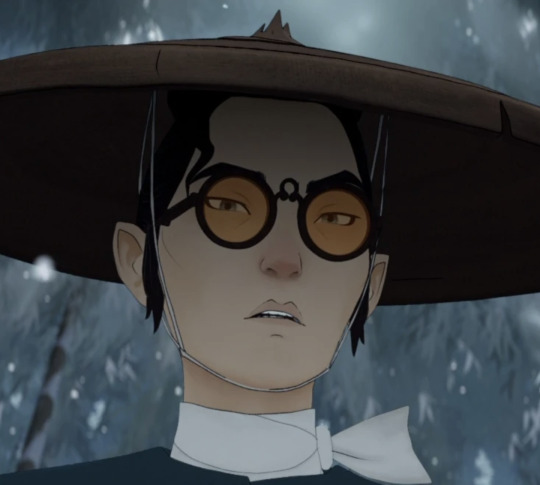
I watched all eight episodes of season 1 of Blue Eye Samurai over the weekend. I then went browsing because I wanted to read some online reviews of the show to see what people were thinking of it and also because I wanted to interact with gifs and art, as the series is visually stunning.
Yet, in my search for opinions on the show, I came across several points I'd like to address in my own words:
Mizu’s history and identity are revealed piece-by-piece and the “peaches” scene with Mizu and Ringo at the lake is intended to be a major character reveal. I think it’s weird that some viewers got angry over other viewers intentionally not gendering Mizu until that reveal, rather than immediately jumping to gender the character as the other characters in the show do. The creators intentionally left Mizu’s gender and sexuality ambiguous (and quite literally wrote in lines to lead audiences to question both) to challenge the viewer’s gut assumption that this lone wolf samurai is a man. That intentional ambiguity will lead to wide and ambiguous interpretations of where Mizu fits in, if Mizu fits in at all. But don't just take my word for this:
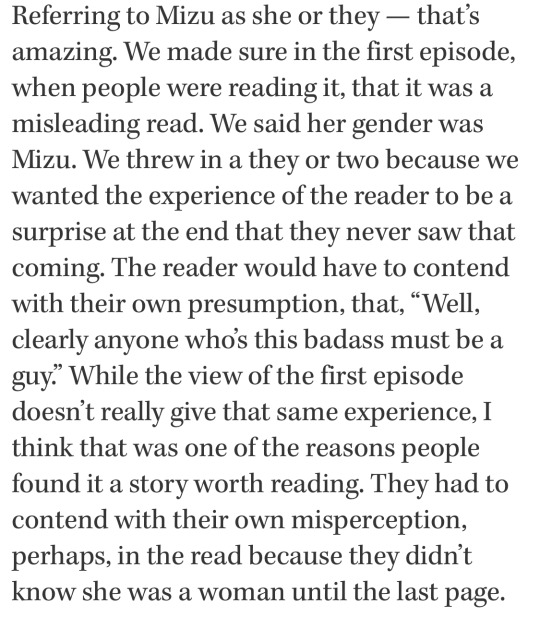
Re: above. I also think it’s weird that some viewers got upset over other viewers continuing to acknowledge that Mizu has a very complicated relationship with her gender, even after that reveal. Canonically, she has a very complicated relationship with her identity. The character is intended to represent liminality in identity, where she’s often between identities in a world of forced binaries that aren’t (widely) socially recognized as binaries. But, again, don’t just take my word for this:
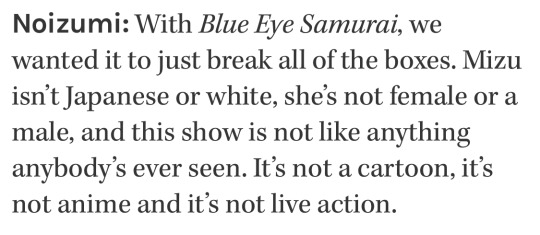
Mizu is both white and Japanese, but she is also not white and not Japanese simultaneously (too white to be Japanese and too Japanese to be white). She’s a woman and a man. She’s a man who’s a woman. She’s also a woman who’s not a woman (yet also not quite a man). But she’s also a woman; the creators said so. Mizu was raised as a boy and grew into a man, yet she was born a girl, and boyhood was imposed upon her. She’s a woman when she’s a man, a man when she’s a man, and a woman when she’s a woman.
Additionally, Mizu straddles the line between human and demon. She’s a human in the sense she’s mortal but a demon in the sense she’s not. She's human yet otherworldly. She's fallible yet greatness. She's both the ronin and the bride, the samurai and the onryō. In short, it’s complicated, and that’s the point. Ignoring that ignores a large part of her internal character struggle and development.
Mizu is intended to represent an “other,” someone who stands outside her society in every way and goes to lengths to hide this “otherness” to get by. Gender is a mask; a tool. She either hides behind a wide-brimmed hat, glasses, and laconic anger, or she hides behind makeup, her dress, and a frown. She fits in nowhere, no matter the identity she assumes. Mizu lives in a very different time period within a very different sociocultural & political system where the concept of gender and the language surrounding it is unlike what we are familiar with in our every-day lives. But, again, don’t just take my word for this:
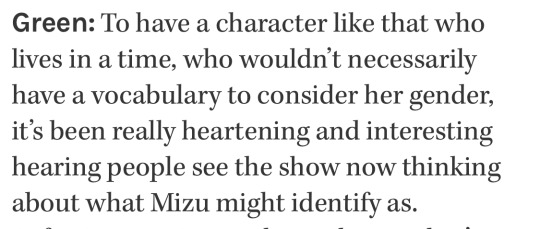
It’s also weird that some viewers have gotten upset over the fact women and queer people (and especially queer women) see themselves in Mizu. Given her complicated relationship with identity under the patriarchy and colonial violence, I think Mizu is a great character for cis-het women and queer folks alike to relate to. Her character is also great for how she breaks the mold on the role of a biracial character in narratives about identity (she’s not some great bridge who will unite everyone). It does not hurt anyone that gender-fluid and nonbinary people see themselves in Mizu's identity and struggle with identity. It does not hurt anyone that lesbians see themselves in the way Mizu expresses her gender. It does not hurt anyone that trans men see themselves in Mizu's relationship with manhood or that trans women can see themselves in Mizu when Mama forces her to be a boy. It's also really cool that cis-het women see themselves in Mizu's struggles to find herself. Those upset over these things are missing critical aspects of Mizu's character and are no different from the other characters in the story. The only time Mizu is herself is when she’s just Mizu (“…her gender was Mizu”), and many of the other characters are unwilling to accept "just Mizu." Accepting her means accepting the complicatedness of her gender.
Being a woman under the patriarchy is complicated and gives women a complicated relationship with their gender and identity. It is dangerous to be a woman. Women face violence for being women. Being someone who challenges sex-prescribed norms and roles under patriarchy also gives someone a complicated relationship with their identity. It is dangerous to usurp gender norms and roles (then combine that with being a woman...). People who challenge the strict boxes they're assigned face violence for existing, too. Being a racial or ethnic minority in a racially homogeneous political system additionally gives someone a complicated relationship with their identity. It is dangerous to be an ethnic minority when the political system is reproduced on your exclusion and otherness. They, too, face violence for the circumstances of their birth. All of these things are true. None of them take away from the other.
Mizu is young-- in her early 20s-- and she has been hurt in deeply affecting ways. She's angry because she's been hurt in so many different ways. She's been hurt by gender violence, like "mama's" misogyny and the situation of her birth (her mother's rape and her near murder as a child), not to mention the violent and dehumanizing treatment of the women around her. She's been hurt by racial violence, like the way she has been tormented and abused since childhood for the way she looks (with people twice trying to kill her for this before adulthood). She's been hurt by state-sanctioned violence as she faces off against the opium, flesh, and black market traders working with white men in contravention of the Shogun's very policies, yet with sanction from the Shogun. She's been hurt by colonial violence, like the circumstances of her birth and the flood of human trafficking and weapons and drug trafficking in her country. She's had men break her bones and knock her down before, but only Fowler sexually differentiated her based on bone density and fracture.
Mizu also straddles the line between victim and murderer.
It seems like Mizu finding her 'feminine' and coming to terms with her 'female side' may be a part of her future character development. Women who feel caged by modern patriarchal systems and alienated from their bodies due to the patriarchy will see themselves in Mizu. They understand a desire for freedom that the narrow archetypes of the patriarchy do not afford them as women, and they see their anger and their desire for freedom in Mizu. This, especially considering that Mizu's development was driven by one of the creators' own experiences with womanhood:
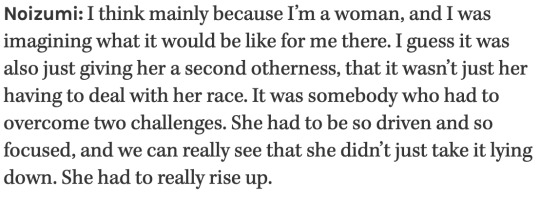
No, Mizu does not pass as a man because she "hates women" or because she hates herself as a woman or being a woman. There are actual on-screen depictions of Mizu's misogyny, like her interactions with Akemi, and dressing like a man is not an instance of this. Mizu shows no discomfort with being a woman or being seen as a woman, especially when she intends to pass herself as and present as a woman. Mizu also shows the women in the series more grace and consideration than any man in the show, in whatever capacity available to her socially and politically, without revealing herself; many of the women have remarked that she is quite unlike other men, and she's okay with that, too.
When she lives on the farm with Mama and Mikio, Mizu shows no discomfort once she acclimates to the new life. But people take this as conclusive evidence of the "only time" she was happy. She was not. This life was also a dance, a performance. The story of her being both the ronin and the onryō revealed to the audience that this lifestyle also requires her to wear a mask and dance, just as the bride does. This mask is makeup, a wedding dress, and submission, and this performance is her gender as a wife. She still understands that she cannot fully be herself and only begins to express happiness and shed her reservation when she believes she is finally safe to be herself. Only to be betrayed. Being a man is her safety, and it is familiar. Being a boy protected her from the white men as a child, and it might protect her heart now.
Mizu shows no discomfort with being known as a woman, except when it potentially threatens her goals (see Ringo and the "peaches" scene). She also shows no discomfort with being known as, seen as, or referred to as a man. As an adult, she seems okay- even familiar- with people assuming she's a man and placing her into the role of a man. Yet, being born a girl who has boyhood violently imposed upon her (she did not choose what mama did to her) is also an incredibly important part of her lived experience. Being forced into boyhood, but growing into a man anyway became part of who she is. But, being a man isn’t just a part of who she became; it’s also expedient for her goals because men and women are ontologically different in her world and the system she lives under.
She's both because she's neither, because- ontologically- she fits nowhere. When other characters point out how "unlike" a man she is, she just shrugs it off, but not in a "well, yeah, because I'm NOT a man" sort of way, but in an "I'm unlike anyone, period," sort of way. She also does not seem offended by Madam Kaji saying that Mizu’s more man than any who have walked through her door.
(Mizu doesn’t even see herself as human, let alone a woman, as so defined by her society. And knowing that creators have stated her future arc is about coming into her “feminine era” or energy, I am actually scared that this show might fall into the trope of “domesticating”/“taming” the independent woman, complete with an allegory that her anger and lack of human-ness [in Mizu’s mind] is a result of a woman having too much “masculine energy” or being masculine in contravention of womanness.)
Some also seem to forget that once Mama and Mikio are dead, no one knows who she is or where she came from. They do not have her background, and they do not know about the bounty on her (who levied the bounty and why has not yet been explained). After their deaths, she could have gone free and started anew somehow. But in that moment, she chose to go back to life as a man and chose to pursue revenge for the circumstances of her birth. Going forward, this identity is no longer imposed upon her by Mama, or a result of erroneous conclusions from local kids and Master Eiji; it was because she wanted people to see her as a man and she was familiar with navigating her world, and thus her future, as a man. And it was because she was angry, too, and only men can act on their anger.
I do think it important to note that Mizu really began to allow herself to be vulnerable and open as a woman, until she was betrayed. The question I've been rattling around is: is this because she began to feel safe for the first time in her life, or is this part of how she sees women ontologically? Because she immediately returns to being a man and emotionally hard following her betrayal. But, she does seem willing to confide in Master Eiji, seek his advice, and convey her anxieties to him.
Being a man also confines Mizu to strict social boxes, and passing herself as a man is also dangerous.
Mizu doesn't suddenly get to do everything and anything she wants because she passes as a man. She has to consider her safety and the danger of her sex being "found out." She must also consider what will draw unnecessary attention to her and distract her from her goals. Many viewers, for example, were indignant that she did not offer to chaperone the mother and daughter and, instead, left them to the cold, only to drop some money at their feet later. The indignity fails consider that while she could bribe herself inside while passing as a man, she could not bribe in two strangers. Mizu is a strange man to that woman and does not necessarily have the social position to advocate for the mother and daughter. She also must consider that causing small social stirs would distract from her goals and draw certain attention to her. Mizu is also on a dangerous and violent quest.
Edo Japan was governed by strict class, age, and gender rules. Those rules applied to men as well as women. Mizu is still expected to act within these strict rules when she's a man. Being a man might allow her to pursue revenge, but she's still expected to put herself forward as a man, and that means following all the specific rules that apply to her class as a samurai, an artisan (or artist), and a man. That wide-brimmed hat, those orange-tinted glasses, and her laconic tendencies are also part of a performance. Being a boy is the first mask she wore and dance she performed, and she was originally (and tragically) forced into it.
Challenging the normative identities of her society does not guarantee her safety. She has limitations because of her "otherness," and the transgression of sex-prescribed roles has often landed people in hot water as opposed to saving them from boiling. Mizu is passing herself off as a man every day of her life at great risk to her. If her sex is "found out" on a larger scale, society won’t resort to or just start treating her as a woman. There are far worse fates than being perceived as a woman, and hers would not simply be a tsk-tsk, slap on the wrist; now you have to wear makeup. Let's not treat being a woman-- even with all the pressures, standards, fears, and risks that come with existing as a woman-- as the worst consequence for being ‘found out’ for transgressing normative identity.
The violence Mizu would face upon being "found out" won’t only be a consequence of being a "girl." Consider not just the fact she is female and “cross-dressing” (outside of theater), but also that she is a racial minority.
I also feel like many cis-het people either ignore or just cannot see the queerness in challenging gender roles (and thus also in stories that revolve around a subversion of sex-prescribed gender). They may not know how queerness-- or "otherness"-- leads to challenging strict social stratifications and binaries nor how challenging them is seen by the larger society as queer ("strange," "suspicious," "unconventional," even "dishonorable," and "fraudulent"), even when "queerness" (as in LGBTQ+) was not yet a concept as we understand it today.
Gender and sexuality- and the language we use to communicate who we are- varies greatly across time and culture. Edo Japan was governed by strict rules on what hairstyles, clothes, and weapons could be worn by which gender, age, and social group, and this was often enshrined in law. There were specific rules about who could have sex with whom and how. These values and rules were distinctly Japanese and would not incorporate Western influences until the late 1800s. Class was one of the most consequential features to define a person's fate in feudal Japan, and gender was quite stratified. This does not mean it's inappropriate for genderqueer people to see themselves in Mizu, nor does this mean that gender-variant identities didn’t exist in Edo Japan.
People in the past did not use the same language we do today to refer to themselves. Example: Alexander The Great did not call himself a "bisexual." We all understand this. However, there is a very weird trend of people using these differences in language and cultures across time to deny aspects of a historical person's life that societies today consider taboo, whether these aspects were considered taboo during that historical time period or not. Same example: people on Twitter complaining that Netflix "made" Alexander The Great "gay," and after people push back and point out that the man did, in fact, love and fuck men, hitting back with "homosexuality wasn't even a word back then" or "modern identity didn't exist back then." Sure, that word did not exist in 300s BCE Macedonia, but that doesn't mean the man didn't love men, nor does that mean that we can't recognize that he'd be considered "queer" by today's standards and language.
Genderqueer, as a word and as the concept is understood today, did not exist in feudal Japan, but the people did and feudal Japan had its own terms and concepts that referred to gender variance. But while the show takes place in Edo Japan, it is a modern adult animation series made by a French studio and two Americans (nationality). Mizu is additionally a fictional character, not a historical figure. She was not created in a vacuum. She was created in the 21st century and co-written by a man who got his start writing for Sex in the City and hails from a country that is in the midst of a giant moral panic about genderqueer/gender-variant people and gender non-conforming people.
This series was created by two Americans (nationality) for an American company. In some parts of that country, there are laws on the book strictly defining the bounds of men and women and dictating what clothes men and women could be prosecuted for wearing. Changes in language and identity over time mean that we can recognize that if Mizu lived in modern Texas, the law would consider her a drag performer, and modern political movements in the show creators' home country would include her under the queer umbrella.
So, yeah, there will also be genderqueer people who see themselves in Mizu, and there will be genderqueer fans who are firm about Mizu being queer to them and in their “headcanons.” The scene setting being Edo Japan, does not negate the modern ideas that influence the show. "Nonbinary didn't exist in Edo Japan" completely ignores that this show was created to explore the liminality of modern racial, gender, class, and normative identities. One of the creators was literally inspired by her own relationship with her biracial identity.
Ultimately, the fact Mizu, at this point in her journey, chooses to present and pass as a man and the fact her presented gender affects relationship dynamics with other characters (see: Taigen) gives this story a queer undertone. And this may have been largely unintentional: "She’s a girl, and he’s a guy, so, of course, they get together," < ignoring how said guy thinks she’s a guy and that she intentionally passes herself as a guy. Audiences ARE going to interpret this as queer because WE don’t live in Edo-era Japan. And I feel like people forget that Mizu can be a woman and the story can still have queer undertones to it at the same time.
#Blue Eye Samurai#‘If I was transported back in time… I’d try to pass myself off as a man for greater freedom.’#^^^ does not consider the intersection of historically queer existence across time with other identities (& the limitations those include)#nor does it consider the danger of such an action#I get it. some come to this conclusion simply because they know how dangerous it is to be a woman throughout history.#but rebuking the normative identities of that time period also puts you at great risk of violence#challenging norms and rules and social & political hierarchies does not make you safer#and it has always been those who exist in the margins of society who have challenged sociocultural systems#it has always been those at greatest risk and who've faced great violence already. like Mizu#Anyway... Mizu is just Mizu#she is gender queer (or gender-variant)#because her relationship with her gender is queer. because she is gender-variant#‘queer’ as a social/political class did not exist. but people WE understand as queer existed in different historical eras#and under different cultural systems#she’s a woman because queer did not exist & ‘woman’ was the sex caste she was born into#she’s also a woman because she conceptualizes herself as so#she is a woman AND she is gender-variant#she quite literally challenges normative identity and is a clear example of what sex non-conforming means#Before the actual. historic Tokugawa shogunate banned women from theater#there were women in the theater who cross-dressed for the theater and played male roles#so I’m also really tired of seeing takes along the lines of: ‘Edo Japan was backwards so cross dressers did’t exist then!’#like. please. be more transparent won’t you?
21 notes
·
View notes